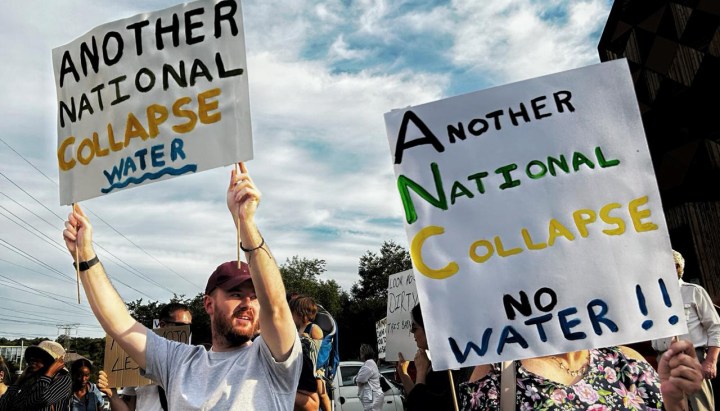 |
 |
Johannesburg's mayor, Kabelo Gwamanda, convened a crisis meeting on 12 March 2024 to provide an update on the recovery of the collapsing water system in the city. The meeting came as thousands of Johannesburg residents have been scrambling for water for almost two weeks. Johannesburg Water had postponed the replacement of an emergency valve for the Sandton water meter due to unfavorable weather conditions, prolonging residents' suffering. Two months later, Johannesburg Water teams' investigations at the Rand Water Waterval Dal meter revealed that the meter reading indicated zero flow of water.
Johannesburg remains in the grip of a water crisis despite the city's dams and reservoirs remaining at satisfactory levels. The Vaal dam sits at approximately 65% capacity, yet Johannesburg continues to suffer water shortages. Expert and WaterCan Manager Dr Ferrial Adam said that minor faults will affect entire pump stations or reservoirs, having far-reaching repercussions. Water leakages are another problem affecting the city supply, and Rand Water has repeatedly stressed the importance of reporting such incidents. According to Adam, Johannesburg is losing between 40% and 44% of its supply through non-revenue water, which means that up to 44% of fresh drinking water is being lost, with 25% being lost to leaks.
Soweto residents have faced water problems amid soaring temperatures and official announcements encouraging residents to stay hydrated. Fikike Mabasa, a resident of Protea in Soweto, said that Jojo tanks, which she shares with her neighbors, do not cater for everyone's water needs. Sakhumzi Restaurant owner Fikike Mabasa said that the water crisis has been a mess, and other businesses have come under strain.
Bordeaux residents say they have not had water since 1 March 2024, and no water tanks have been provided. Many areas in Soweto and the Vaal do not have water or are experiencing very limited supply. Contrary to Joburg Water's announcement on Tuesday that most affected reservoirs at the Eikenhof Pump Station had recovered and were supplying residents with water, many areas remained dry.
Blairgowrie residents have been protesting for 10 days due to water cuts, which began two weeks ago due to power constraints and gravity. The community is demanding daily protests until they have access to water again. Residents have reported that there has been no clear information on when water will be available or the problem, and there is a lack of clarity on how the network of reservoirs is connected to facilitate flow.
Neighbourhood unity has been observed, with those who have water supply helping those who don't, as the absence of city tankers has been insufficient. They have offered borehole water and emptied swimming pools, which is unsustainable and poses a health hazard. Children are getting sick from the gems and not being able to sanitise.
DA Ward 99 Councillor Nicole Van Dyk, also shadow MMC for Water and Power in the City of Johannesburg, told Daily Maverick that 25 of 26 suburbs including Blairgowrie have not had water since 9 March. She stated that the city's infrastructure is far from being adequately managed, with Rand Water taking 70% of the cost of the asset for maintenance and Joburg Water 30%. Dr. Adam, a doctor in the city, stressed that the water issue requires urgent attention.
According to the government's Blue Drop, Green Drop, and No Drop reports, almost 50% of drinking water systems in the country are not drinkable. Additionally, almost 70% of wastewater treatment works are considered critical or in a concerning state, leading to high levels of sewer flowing into rivers and streets and polluting the rivers. Dr. Adam said that Rand Water, as a licensed and bulk supplier, should take 70% responsibility and Joburg Water 30%.
Rand Water has applied for an increase in the tariff despite not having recouped a lot of money owed by municipalities. She believes it does not make sense for Rand Water to increase the tariff when they have not recouped the money owed by municipalities.
The community is demanding immediate action from Rand Water and Johannesburg Water to address the water crisis and ensure that the community receives the necessary services. The city's infrastructure is far from being adequately managed, and the future of the city's water is uncertain.
Neighbourhood unity has been observed, with those who have water supply helping those who don't, as the absence of city tankers has been insufficient. They have offered borehole water and emptied swimming pools, which is unsustainable and poses a health hazard. Children are getting sick from the gems and not being able to sanitise.
DA Ward 99 Councillor Nicole Van Dyk, also shadow MMC for Water and Power in the City of Johannesburg, told Daily Maverick that 25 of 26 suburbs including Blairgowrie have not had water since 9 March. She stated that the city's infrastructure is far from being adequately managed, with Rand Water taking 70% of the cost of the asset for maintenance and Joburg Water 30%. Dr. Adam, a doctor in the city, stressed that the water issue requires urgent attention.
According to the government's Blue Drop, Green Drop, and No Drop reports, almost 50% of drinking water systems in the country are not drinkable. Additionally, almost 70% of wastewater treatment works are considered critical or in a concerning state, leading to high levels of sewer flowing into rivers and streets and polluting the rivers. Dr. Adam said that Rand Water, as a licensed and bulk supplier, should take 70% responsibility and Joburg Water 30%.
Rand Water has applied for an increase in the tariff despite not having recouped a lot of money owed by municipalities. She believes it does not make sense for Rand Water to increase the tariff when they have not recouped the money owed by municipalities.
The community is demanding immediate action from Rand Water and Johannesburg Water to address the water crisis and ensure that the community receives the necessary services. The city's infrastructure is far from being adequately managed, and the future of the city's water is uncertain.

